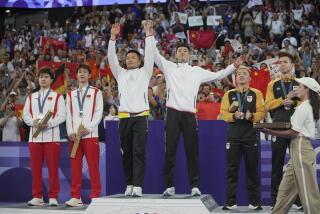A Warming in Taiwan Strait? : Entrepreneurial Taipei looks to loosen things up with reluctant Beijing
- Share via
Taiwan has entered a new era. Having declared an end to its 43-year civil war with Beijing, the island is free of the ideological shackles of its aging legislators, who last faced elections in the 1940s. A process of political reform has begun that may result in a new, and welcome, Taipei-Beijing connection.
Taiwan President Lee Teng-hui formally ended the state of war with the communist government of China on May 1. Chiang Kai-shek made the declaration in 1948, a year before his Nationalist Party, or Kuomintang, government fled to Taiwan. The constitution also was suspended and mainland-elected members of the National Assembly and the Legislative Yuan, or parliament, have held their seats since then.
Thus Taiwan’s politics have not kept pace with the incredible economic development of the tiny island located southeast of China. Its hard-working population of 20 million, nestled in an area about the size of Connecticut and New Hampshire combined, are among the world’s best entrepreneurs. They have transformed Taiwan into an aggressive exporter. Now Taiwan ranks among the United States’ top 10 trading partners.
Yet Taipei only lifted martial law four years ago. Its aging politicians, who still hold the majority in both houses, have desperately clung to their 1949 goal to regain the mainland. Disagreement over constitutional reform erupted in an ugly brawl last month in the National Assembly that put two members in the hospital. But the Nationalist Party pushed through some constitutional reforms that call for the election of a new National Assembly by the end of this year and a new Legislative Yuan by 1993. The opposition Democratic Progressive Party, however, wants a new constitution.
Meanwhile, Taipei is sending new and neighborly signals to Beijing, which still considers Taiwan a breakaway province. Although the two have no formal diplomatic ties, Taipei is urging Beijing to renounce the use of force in an attempt to fulfill a goal of reunification.
Beijing so far has refused. Nevertheless it did receive a semi-official Taiwan delegation, the first ever, on the same day that Lee declared an end to the civil war. With that, Taipei has nudged open the door for a new and promising relationship with Beijing. The first critical step toward mutual trust has been taken.
More to Read
Sign up for Essential California
The most important California stories and recommendations in your inbox every morning.
You may occasionally receive promotional content from the Los Angeles Times.










